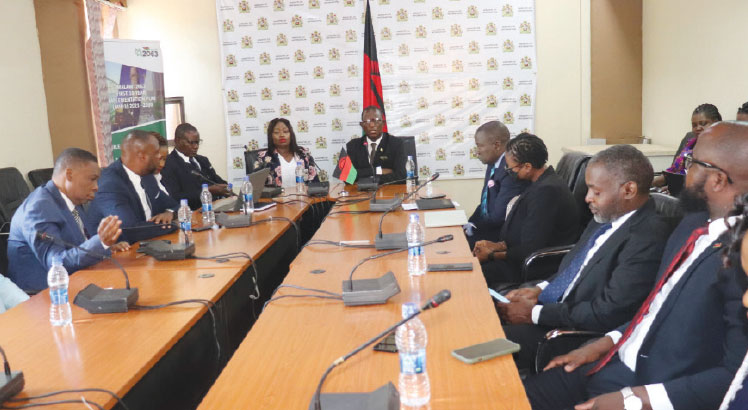Fee paying in public hospitals is back in national discourse following recommendations by a special law commission on the back of decades-long cost-sharing debate.
But local health experts have said the proposed amendments to Malawi’s Public Health Act announced in Lilongwe on Wednesday could disenfranchise the poor from public health services.
The recommendations by the Special Law Commission on the Review of the Public Health Act include introducing nominal fees in public hospitals, establishing a health emergency fund and a scheme to regulate chemical trials.
But some health economists fear that the off-pocket payments for healthcare would hurt the poor who may either avoid seeking medical assistance or slide into ultra poverty as a result of crippling healthcare bills.
Commission members during the press briefing yesterday
Jobiba Chinkhumba, a lecturer in the Health Economics and Policy Unit of Kamuzu College of Health Sciences (Kuhes) said in an interview yesterday that when the suggestions are taken to Parliament, lawmakers should consider the country’s poor majority who have little capacity to pay.
He said: “Mechanisms should be put in place to exempt and cushion vulnerable groups in our society to ensure the poor still have access to healthcare whenever they need it.
“More importantly, this policy should be closely monitored for early detection of unintended consequences.”
The commission, led by Supreme Court Judge Dingiswayo Madise, recommends the nominal fees to address financial challenges haunting the public health sector. It further proposes that all workers in gainful employment should have a health insurance.
“The commission finds it imperative that beneficiaries should contribute to the financing of health services either through health insurance or out of pocket payments,” the commission’s report reads in part.
However, the commissioners propose that the nominal fees should not be charged on “public health services of national interest” such as immunisation, family planning, antenatal and emergency treatment, including accidents.
In a separate interview, health economist Dominic Nkhoma said getting everyone with the capacity to pay to contribute to health financing is crucial to self-reliance. However, he said it may not be easy to identify and isolate the poor to protect them from paying.
Nkhoma urged legislators and policymakers to come up with feasible factors for distinguishing exempted patients consistent with national and global best practices.
These include Universal Health Coverage, which requires everyone to get quality healthcare close to where they live without suffering hardships, including financial burdens.
Nkhoma argued: “A key consideration should be that the reform does not promote out-of-pocket payments at the point [of entry] and that the system does not create barriers to access for the poor.
“This will require determining a road roadmap for the short, medium and long-term, including capacity building and institutional arrangements for effective implementation.”
The commission also proposed strict regulation of clinical trials involving medicines and other pharmaceutical products, making registration of all studies by the Pharmacy and Medicine Regulatory Authority as well as accreditation of researchers and audits of research ethics mandatory.
But Malawi Health Equity Network executive director George Jobe, while applauding the reform on clinical trials, said in an interview yesterday that he expects the authority to bring sanity to the biomedical research.
“This will stop the abuse of Malawians through participation in trials that are not thoroughly regulated.
“I think the law should demand further that Malawi should be given free drugs or any medical products approved after a trial its citizens participated in,” Jobe said.
He, however, opposed proposals for nominal healthcare fees at access point, saying they may further impoverish patients who have to choose between buying basics and seeking medical help.
He urged government to remain open for further feedback.
During the release of the report, Deputy Minister of Health Enoch Phale said the recommendation on fees is in line with the ministry’s plan health financing plans.
The post Hospital fees back on agenda appeared first on The Nation Online.
 Moni Malawi
Moni Malawi 
